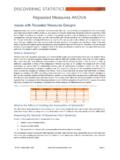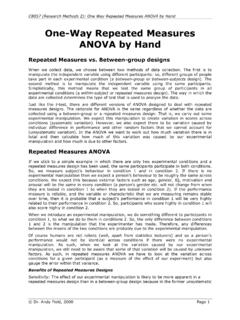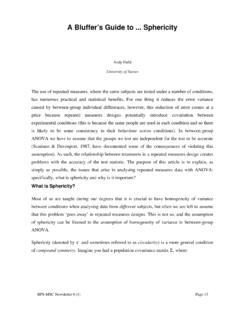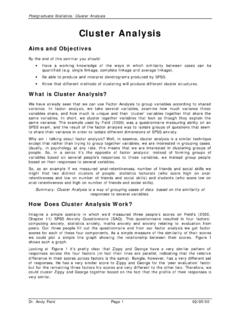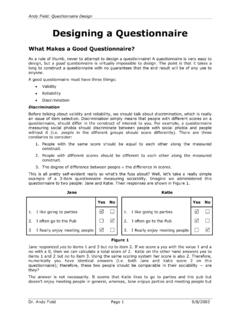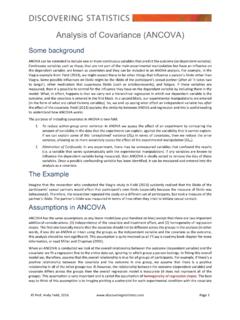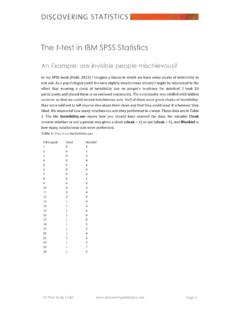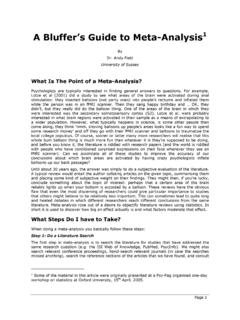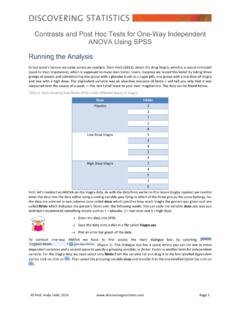Transcription of Discovering Statistics Handbook 2015-16
1 School of Psychology Module Handbook 2015/2016 Discovering Statistics Module Convenor: Professor Andy Field NOTE: Most of the questions you need answers to about this module are in this document. Please read it fully and carefully before your first lecture. NOTE: This document concerns the structure and content of the module. If you have questions about procedures, please consult the School of Psychology Administration Office in Pev1 2A13 or via c8552 : Discovering Statistics Professor Andy Field Page 2 Contents Contents.
2 2 Module Overview .. 4 Assessed Learning Outcomes .. 4 Method of Student Feedback .. 4 Assessment .. 4 People .. 4 Module Organiser .. 4 Lecturers .. 5 Practical Tutors .. 5 Learning Resources .. 5 Books .. 5 Handouts .. 5 Internet .. 5 Getting Help .. 6 Study Direct .. 7 Face- to- Face .. 8 Email .. 8 Student Mentors .. 8 Teaching Arrangements .. 8 Timetable .. 8 Practical classes .. 9 Project Partners .. 10 Assessment .. 10 Undergraduates ( c8552 ).
3 10 Postgraduates (500C8) .. 10 Visiting and Exchange Students .. 11 A note about Collusion .. 11 Coursework .. 11 Assessment Criteria for in class exercises .. 11 Assessment Criteria for Laboratory Reports .. 12 The Marking Process .. 12 c8552 : Discovering Statistics Professor Andy Field Page 3 What if I don t agree with my mark? .. 13 The January Unseen Exam .. 13 RESIT and SIT opportunities .. 13 Research Participation (Undergraduates Only).
4 13 Reading List .. 13 Recommended Text .. 14 Reading by Topic .. 14 Topic 1: De- mystifying Statistics .. 14 Topic 2: The PENIS of Statistics .. 15 Topic 3: Experimental Methods and writing up research .. 15 Topic 4: The beast of bias .. 15 Topic 5: Linear Models (Including Bias in Linear Models) .. 15 Topic 6: Categorical predictors and moderation .. 15 Topic 7: One- Way Independent ANOVA .. 15 Topic 8: Analysis of Covariance (ANCOVA) (AF).
5 15 Topic 9: Two- Way Independent ANOVA (AF) .. 16 Topic 10: Repeated Measures ANOVA (AF) .. 16 Topic 11: Mixed ANOVA (AF) .. 16 Appendix: A Guide to Symbols for this Module .. 17 c8552 : Discovering Statistics Professor Andy Field Page 4 Module Overview Discovering Statistics is a 15 credit module that runs during the Autumn term (T1). Discovering Statistics two components: (1) statistical analysis and (2) empirical research. The empirical project enables students to carry out independent research that will develop skills in experimental research.
6 This project helps to prepare students for their final empirical research project. The statistical analysis parts of the module build upon existing knowledge of statistical theory to enable students to analyse more complex data structures through understanding the general linear model (regression, ANOVA etc.). Practical classes compliment the lectures by providing guidance on applying the general linear model using SPSS, advice on designing and executing projects, and conducting experimental research.
7 Assessed Learning Outcomes Lectures and practical classes provide a framework in which students will be able to: 1. Explain the conceptual underpinnings of the general linear model: Regression, Multiple Regression, Analysis of Variance (ANOVA), and Analysis of Covariance (ANCOVA). 2. Make informed decisions about how to analyse data sets appropriately and explain these decisions. 3. Conduct and interpret these analyses on SPSS. 4. Design, execute, analyse, and write up (in APA format) experimental research projects. 5.
8 Work independently from a tutor in small groups, as a foundation for their individual research project in the third year. Method of Student Feedback Anonymous questionnaires at the end of each term, reported at the next Psychology meeting. You are encouraged to complete these as fully as possible because we do read them and they provide invaluable feedback on further Module improvement. Assessment See the section on assessment. People Module Organiser I (Andy Field) am Module organiser.
9 If you would like a meeting with me to discuss something about the module then I m happy to chat after (or before) lectures and I try to drop into practical classes too. You can also book an appointment at: I really do appreciate it when people take the time to check this module document, FAQs and forums for an answer first, and when people with similar problems (project advice and so on) come to see me in groups rather than individually.
10 During term time, I have 2 drop in office hours (see the Sussex website for times) - no appointment is necessary for these. c8552 : Discovering Statistics Professor Andy Field Page 5 During working hours I live in room 2B7 Pevensey 1 Building, ext. 7150 (877150 from outside). @ProfAndyField Lecturers I take all of the lectures on this module. Practical Tutors The practical tutors are probably the most important people with whom you have contact.
